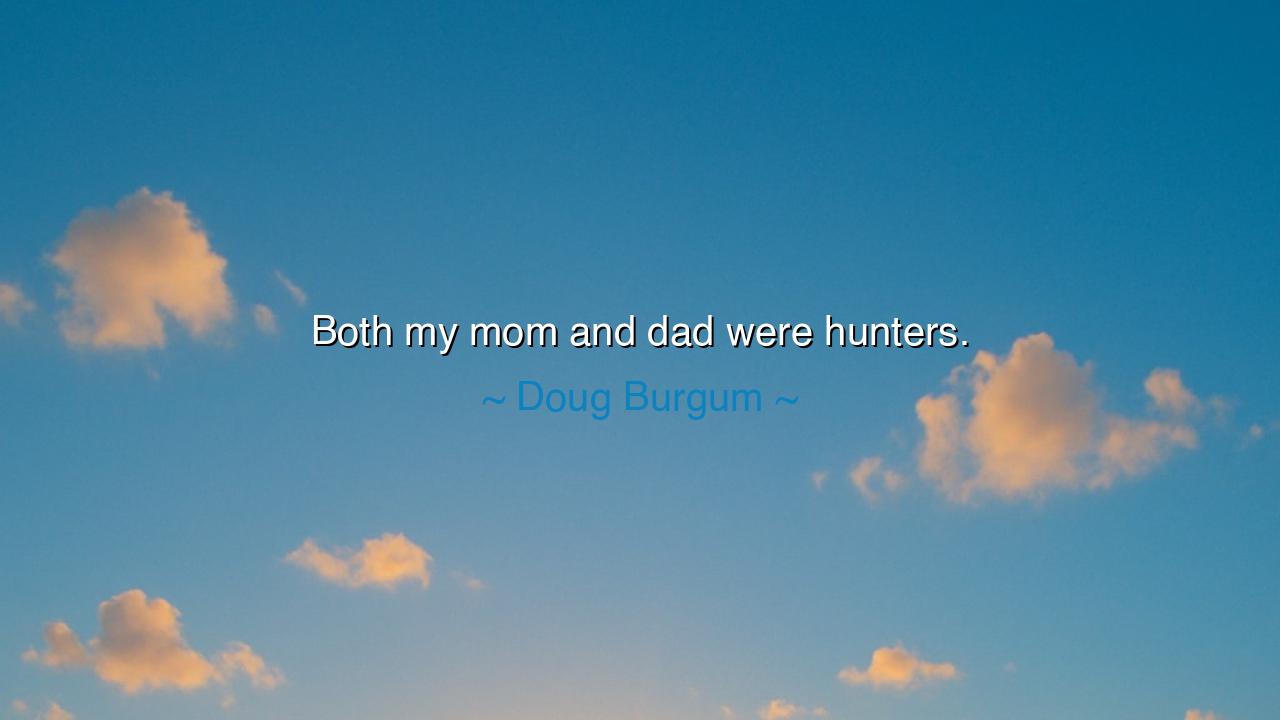
Both my mom and dad were hunters.






“Both my mom and dad were hunters.” Thus spoke Doug Burgum, a man shaped by the wind and wilderness of North Dakota, whose words, though simple, carry the weight of an ancient inheritance. To the unknowing ear, this may sound like a plain recollection of family life—but in truth, it is a declaration of spirit, a testament to the virtues of endurance, resourcefulness, and reverence for the land. For the hunter has always been more than one who seeks game; he is the symbol of humanity’s eternal striving—between nature and need, between instinct and intellect, between survival and stewardship.
In the old days, the hunter was the guardian of the tribe, the provider whose courage fed the many. His craft demanded patience, wisdom, and humility before the natural world. Yet Doug Burgum’s words remind us that this spirit of the hunt is not confined to the wild—it is the spirit of life itself. His parents, by calling themselves hunters, lived not merely by rifle or bow, but by the creed of the self-reliant—those who take from the earth only what is needed, and who give back respect in return. They were, as many of their generation were, people who understood that to live is to labor, to strive, and to stay connected to the rhythms of the soil and sky.
The ancients, too, held the hunter in reverence. In Greece, Artemis guarded the wilderness, reminding humankind that mastery of the hunt must be tempered by restraint. In Rome, the god Diana symbolized purity of purpose—taking only what was just. The Native nations of North America, from whom Burgum’s homeland inherited its vast plains, treated the hunt as sacred communion. Before each pursuit, prayers were offered, not for victory, but for balance—for the harmony between man and the life he must take to sustain his own. Thus, the hunter stands as the bridge between gratitude and necessity, embodying the truth that strength without reverence leads only to destruction.
To say that “both my mom and dad were hunters” is also to speak of equality and partnership, virtues too often forgotten in modern times. In those words, Burgum recalls a world where men and women shared equally in the trials of life—not divided by pride or custom, but united in purpose. The mother who hunts is not merely a provider; she is a teacher of courage and a symbol of endurance. Like the ancient matriarchs who tilled the fields, bore the fire, and led their clans through famine and flood, she embodies the wisdom that survival depends not on might alone, but on cooperation. From such parents, a child learns not to expect ease, but to embrace challenge; not to dominate nature, but to walk alongside it.
We may see in this quote, too, the metaphor of modern life. For in every age, man must hunt—not always for food, but for truth, for purpose, for meaning. The world may no longer demand we track the deer or the pheasant, but it still demands that we rise early, pursue diligently, and endure patiently. To be a hunter is to know failure and yet return again to the field. It is to learn that victory belongs not to the strongest, but to the most persistent—to those who can wait, listen, and act with precision when the moment calls.
Consider the example of Theodore Roosevelt, born into comfort but drawn to the rugged heart of the wilderness. Like Burgum’s parents, Roosevelt saw in the hunt not mere sport, but discipline and moral training. It taught him to face hardship, to honor the natural order, and to temper ambition with humility. From that ethos came his love of conservation, his leadership in reform, and his belief that the character of a nation is measured by its relationship to the land. So too does Burgum’s memory of his parents remind us that strength and stewardship must dwell together—that the hand that holds the weapon must also plant and protect.
Therefore, let us take from these words a lesson for our own age: live as hunters, not consumers. Seek what is needed with discipline. Respect what sustains you. Be patient in your pursuits, humble in your triumphs, and grateful for the gifts of the earth. Whether your quarry is food, wisdom, or achievement, let your efforts be guided by honor. For those who hunt with reverence become the true stewards of the world, guarding its life as fiercely as they pursue their own.
In the end, Doug Burgum’s words are not merely a reflection on family, but a call to remembrance—a reminder that we are all, in some sense, descendants of hunters. The world may change, but the virtues that sustained our ancestors—courage, perseverance, respect for nature, and unity between man and woman—remain eternal. To live by those virtues is to keep alive the oldest wisdom of humankind: that life is sacred, and to sustain it requires both strength and grace.






AAdministratorAdministrator
Welcome, honored guests. Please leave a comment, we will respond soon